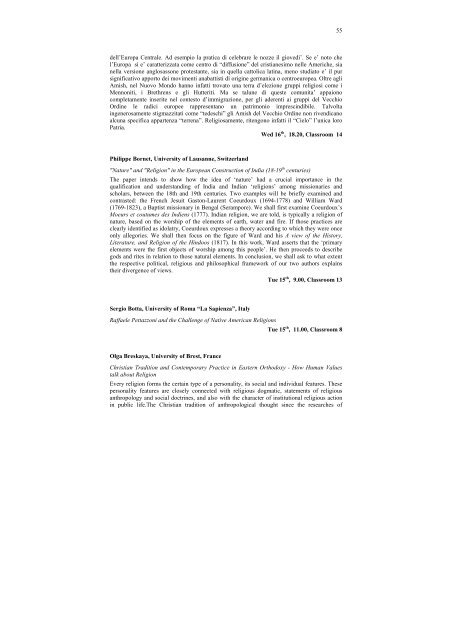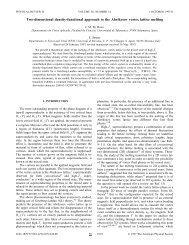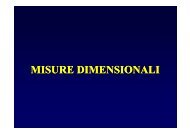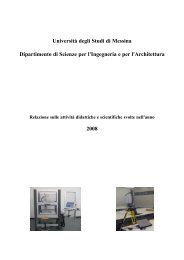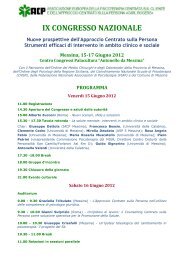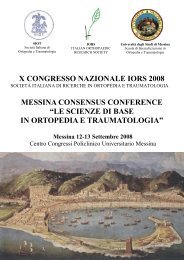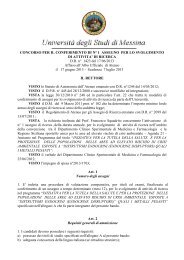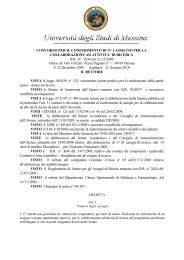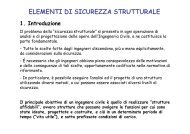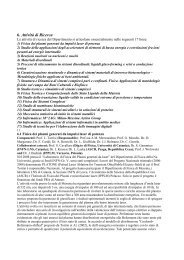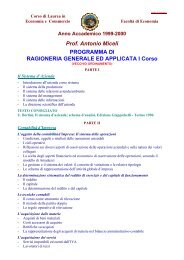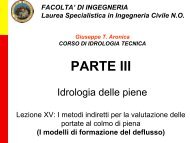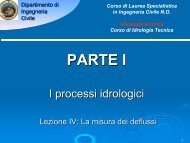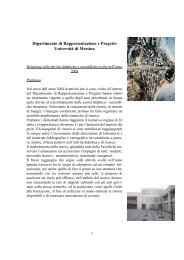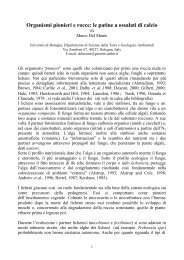PROGRAMME AND ABSTRACTS - Università degli Studi di Messina
PROGRAMME AND ABSTRACTS - Università degli Studi di Messina
PROGRAMME AND ABSTRACTS - Università degli Studi di Messina
Create successful ePaper yourself
Turn your PDF publications into a flip-book with our unique Google optimized e-Paper software.
dell’Europa Centrale. Ad esempio la pratica <strong>di</strong> celebrare le nozze il giove<strong>di</strong>’. Se e’ noto che<br />
l’Europa si e’ caratterizzata come centro <strong>di</strong> “<strong>di</strong>ffusione” del cristianesimo nelle Americhe, sia<br />
nella versione anglosassone protestante, sia in quella cattolica latina, meno stu<strong>di</strong>ato e’ il pur<br />
significativo apporto dei movimenti anabattisti <strong>di</strong> origine germanica o centroeuropea. Oltre agli<br />
Amish, nel Nuovo Mondo hanno infatti trovato una terra d’elezione gruppi religiosi come i<br />
Mennoniti, i Brethrens e gli Hutteriti. Ma se talune <strong>di</strong> queste comunita’ appaiono<br />
completamente inserite nel contesto d’immigrazione, per gli aderenti ai gruppi del Vecchio<br />
Or<strong>di</strong>ne le ra<strong>di</strong>ci europee rappresentano un patrimonio imprescin<strong>di</strong>bile. Talvolta<br />
ingenerosamente stigmazzitati come “tedeschi” gli Amish del Vecchio Or<strong>di</strong>ne non riven<strong>di</strong>cano<br />
alcuna specifica appartenza “terrena”. Religiosamente, ritengono infatti il “Cielo” l’unica loro<br />
Patria.<br />
Wed 16 th , 18.20, Classroom 14<br />
Philippe Bornet, University of Lausanne, Switzerland<br />
"Nature" and "Religion" in the European Construction of In<strong>di</strong>a (18-19 th centuries)<br />
The paper intends to show how the idea of ‘nature’ had a crucial importance in the<br />
qualification and understan<strong>di</strong>ng of In<strong>di</strong>a and In<strong>di</strong>an ‘religions’ among missionaries and<br />
scholars, between the 18th and 19th centuries. Two examples will be briefly examined and<br />
contrasted: the French Jesuit Gaston-Laurent Coeurdoux (1694-1778) and William Ward<br />
(1769-1823), a Baptist missionary in Bengal (Serampore). We shall first examine Coeurdoux’s<br />
Moeurs et coutumes des In<strong>di</strong>ens (1777). In<strong>di</strong>an religion, we are told, is typically a religion of<br />
nature, based on the worship of the elements of earth, water and fire. If those practices are<br />
clearly identified as idolatry, Coeurdoux expresses a theory accor<strong>di</strong>ng to which they were once<br />
only allegories. We shall then focus on the figure of Ward and his A view of the History,<br />
Literature, and Religion of the Hindoos (1817). In this work, Ward asserts that the ‘primary<br />
elements were the first objects of worship among this people’. He then proceeds to describe<br />
gods and rites in relation to those natural elements. In conclusion, we shall ask to what extent<br />
the respective political, religious and philosophical framework of our two authors explains<br />
their <strong>di</strong>vergence of views.<br />
Sergio Botta, University of Roma “La Sapienza”, Italy<br />
Raffaele Pettazzoni and the Challenge of Native American Religions<br />
Olga Breskaya, University of Brest, France<br />
55<br />
Tue 15 th , 9.00, Classroom 13<br />
Tue 15 th , 11.00, Classroom 8<br />
Christian Tra<strong>di</strong>tion and Contemporary Practice in Eastern Orthodoxy - How Human Values<br />
talk about Religion<br />
Every religion forms the certain type of a personality, its social and in<strong>di</strong>vidual features. These<br />
personality features are closely connected with religious dogmatic, statements of religious<br />
anthropology and social doctrines, and also with the character of institutional religious action<br />
in public life.The Christian tra<strong>di</strong>tion of anthropological thought since the researches of


